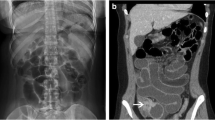Background: Revision of failed bariatric surgical procedures is a significant challenge for every bariatric surgeon. Methods: Evaluated are surgical difficulties, management problems and weight loss in patients with distal gastric bypass as a revisionary procedure. Eighty patients were followed up to 3 years; four were lost to follow-up. Mean age was 43; mean prebariatric surgery weight 134 kg; height 1.65 meters; body mass index 40.1; ideal body weight 62.7 kg; excess weight 70.5 kg; per cent excess weight 214%. A 250 cm stomach-to-ileocecal valve segment of small bowel was used, and the biopancreatic secretions were brought into the terminal ileum 100 cm from the ileocecal valve. Mean pouch size was 63 cc; length of hospital stay 5 days; operative blood loss 616 cc; operative time 130 min. Results: Intraoperative complications included three splenic injuries (without splenectomy). Early complications included one deep vein thrombosis, two marginal ulcers, one GI hemorrhage, one wound dehiscence, one pouch outlet obstruction and one pancreatitis. Late complications included: one death from protein malnutrition/ARDS; 21 hypoproteinemia; six protein malnutrition, and of these, three had hyperalimentation; three cholecystitis; 27 anemia; 22 incisional hernia; two staple-line disruption (reoperated); 26 low serum iron; 11 prolonged (> 6 months) diarrhea; three prolonged frequent vomiting; and two unrelated deaths (chronic myelogenous leukemia and amyotrophic lateral sclerosis). Mean excess weight loss was 83% at 12 months; 89% at 24 months; and 94% at 36 months. Conclusion: The distal gastric bypass is fraught with the operative and immediate post-operative complications experienced in any revisionary bariatric surgery. Distal gastric bypass is very effective in producing long-term weight loss. Nutritional problems are common but usually easily corrected. The most serious nutritional complication is protein malnutrition, which must be identified and corrected early. Success of this procedure is dependent upon patient compliance with proper nutrition and supplements, and regular office follow-up with monitoring of laboratory data. Patients who are noncompliant are at significant risk for complications.
Similar content being viewed by others
Author information
Authors and Affiliations
Rights and permissions
About this article
Cite this article
Fox, S.R., Fox, K.M. & Oh, K.H. The Gastric Bypass for Failed Bariatric Surgical Procedures. OBES SURG 6, 145–150 (1996). https://doi.org/10.1381/096089296765557097
Published:
Issue Date:
DOI: https://doi.org/10.1381/096089296765557097




